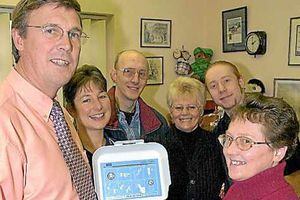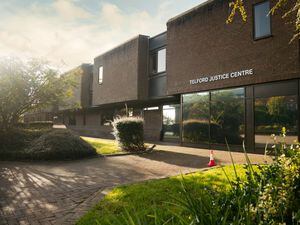Much-loved Shropshire medic Paul Spencer closes his casebook
Weighed down with cards, good wishes and thanks from grateful patients, one of Shropshire's longest serving and best known GPs is saying his goodbyes. But Dr Paul Spencer is also leaving behind a priceless gift of his own – hope.

Weighed down with cards, good wishes and thanks from grateful patients, one of Shropshire's longest serving and best known GPs is saying his goodbyes.
But Dr Paul Spencer is also leaving behind a priceless gift of his own – hope.
A diagnosis of cancer, terrifies most people. Despite progress in diagnosis and treatment, the Big C remains the Big Dread and frightened patients looks to the family GP for reassurance.
But what happens when the roles are reversed and the doctor gets cancer?
Two years ago Paul Spencer, from Dawley Medical Practice in Telford, discovered he had non Hodgkins lymphoma, a form of cancer which affects the glands and blood.
Also a ship's doctor for more than 20 years and back after a month's seaborne journey from Sydney to Peru, he now looks fit, is his usual cheerful self and about to spend his retirement on a Scottish island with wife Marilyn.
He has been local secretary of the BMA and Telford Medical Practitioners Association, chairman of the Crime Prevention panel, doctor to Telford United and Telford Tigers.
For a while he was also one of the doctors for the Welsh football team. Well known, well respected and well loved.
Now, here he was with cancer and a lot of concerned patients.
He says: "One evening while we were watching TV, I felt a lump in the right side of my neck, the size of a small egg. It must have come up pretty well overnight and anybody finding a similar lump would not have ignored it.
"I knew the implications and, yes, straight away thought it might be cancer. But I used the two week rule to wait and see, then I was treated as well as anybody else would be, being a doctor didn't make any difference.
"I had the operation to remove the lump on a Wednesday and the following Saturday, we flew to Brazil. Three weeks later, I got the diagnosis."
Dr Paul's capacity to connect with worried and scared patients moved into another dimension. But interestingly, once his illness was known, it was patients who were really upset.
There were stories of weeping in the waiting room and in time the word went round that Paul had died.
He can share a wry smile now and says: "I suppose it just proves your mortality. Until then I didn't give life a second thought. I thought I was invincible."
His treatment, including chemotherapy worked and he never kept his cancer a secret.
He adds: "Everybody knows anyway because your hair falls out, so I just shaved my head. I had my last treatment in June last year and now have regular checks.
"Retirement has nothing to do with the cancer . . . more to do with a pension!"
He always wanted to be a doctor: "I'm not exactly sure why, but when I said it to people it was always met with greater encouragement than if, say, I'd said I wanted to be a mud wrestler!
"I'm a people person and it's been a privilege for me to do this job. I see mothers now who have had their own babies and I remember when they were born themselves."
Paul, 58, qualified as a doctor in 1976 before working at the then Shrewsbury Hospital North. And on a professional level, has seen many changes in the working practices of a county GP, not all necessarily for the better and including the arrival of salaried GPs who work for practices run by corporate businesses.
"I don't believe they would have the same satisfaction that I have had. Richard Branson is starting his own company, Virgin Health, and there will be more companies employing private doctors to do surgeries," he cautions.
He also thinks that giving patients more choice over healthcare is not necessarily a good thing.
"Patients don't want to choose – patients want doctors to choose. Health and education should not be like going to a supermarket – it should be unequivocally good and free.
"I have been through five major re-organisations, and none of them for the better, but the work itself has not really changed and from a patient point of view they still get a top class service."
Another change was the 1996 introduction of ShropDoc, a service which provides help for patients when their doctor's surgery is closed. Before that GPs had to look after patients round the clock.
"In the countryside that may be possible, but in urban Dawley it was unsustainable," he says.
Over the years the respected doctor, who freely admits he sometimes despairs at 'all the politics' the modern GP has to deal with, has not been shy of speaking his mind. In 2009 he called for the immediate closure of walk-in medical centres branding them a "scandalous waste" of taxpayers' money.
He claimed they were mostly dealing with the 'worried well' and thinks that recent Primary Care changes towards GPs controlling NHS budgets can also be 'fraught with danger'.
Now when a patient is taken to hospital with chest pain, for example, his or her medical practice is billed for care they get.
Dr Spencer says: "There are 12 causes of chest pain – and it could be that you get the bill for the most expensive treatment. Practice managers have to check all the bills to make sure what they are paying for is correct, and that's not what I originally entered medicine for."
It means that patients who wander into casualty for non-urgent treatment for minor ailments incur heavier costs to a GP's budget. He adds: "It's a credit to doctors that we are managing this bureaucratic nonsense without affecting patients."
But now, Dr Paul leaves Shropshire with the happiest of memories, knowing how he has been so valued and saying: "I look forward to another 30 years of a completely different life."
Report by Shirley Tart and Ben Bentley





